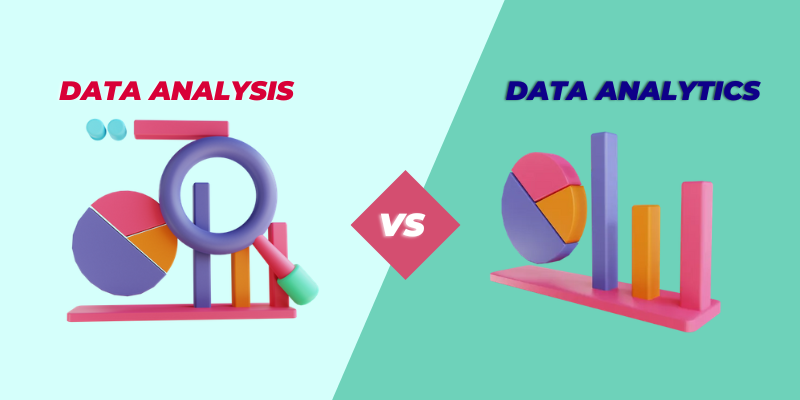Within business intelligence and data science, professionals often use phrases like “data analytics vs data analysis” interchangeably. Nonetheless, these terms have different definitions, approaches, and goals. Let’s examine the difference between Data Analysis and Data Analytics and describe how the data life cycle differs from data analysis. To learn Data Analytics, join the Data Analytics Course in Chennai and equip yourself with essential data mining, machine learning, and business analytics skills.
Data Analytics
Data analytics refers to various data-related activities, including concept, practice, science, and art. The main objective of data experts, such as data scientists, engineers, and analysts, is to facilitate the rest of the business’s access and comprehension of these results.
Unprocessed and unaltered data has no value. Instead, the value comes from how you use that data. The processes you take—both manual and automated—to find, decipher, visualize, and convey the meaning of patterns in your data to inform business strategy. Results are collectively referred to as data analytics.
Data Analysis
Think of data analysis as a portion of data analytics. Data analysis involves cleaning, transforming, modelling, and questioning data to find relevant information. Activities like collection, storage, and visualization are typically considered distinct components.
Data analysis is typically restricted to one pre-existing dataset. You will examine, organize, and query the information. Software or Machines typically perform the initial analysis within one of your tools or databases. However, a human enhances this process by delving deeper into the data and posing more contextual questions.
Scope
Data Analysis: Retrospective data analysis is the main focus of the analysis. It strongly emphasizes using historical data to analyze current trends, behaviours, and events. A typical example of data analysis is looking at sales information from the previous quarter to determine what factors affect changes in revenue.
Data Analytics: Data analytics, on the other hand, is more prospective. It uses predictive analytics and historical data analysis to predict future results. Training institutes in Chennai emphasize the importance of data analytics, helping businesses predict consumer preferences, market trends, and possible hazards using sophisticated algorithms and machine learning models.
Tools and Techniques
Data Analysis: Regression analysis, hypothesis testing, clustering, and other statistical tools and software packages like R, Python, and Excel are the primary tools used in data analysis. The main goals are analyzing data sets, finding anomalies, and coming to insightful conclusions.
Data Analytics: Data mining, machine learning, artificial intelligence (AI), and big data technologies like Hadoop and Spark are just a few tools and methods used in data analytics. These cutting-edge tools make it easier for businesses to process enormous volumes of structured and unstructured data, enabling them to uncover hidden patterns, create predictive models, and achieve a competitive edge.
Objectives
Data Analysis: Gaining a deeper understanding of particular datasets, providing answers to predetermined questions, and resolving specific issues are the main goals of data analysis. It seeks to offer insights that direct strategic choices, streamline workflows, and improve performance across various industries, including marketing, finance, healthcare, and logistics.
Data Analytics: Enhancing customer experiences, finding growth opportunities, reducing risks, and improving business operations are just a few goals that data analytics focuses on. Data analytics allows businesses to analyze information from many sources, create innovative products and services, and stay one step ahead of rivals in ever-changing markets.
Professionals hoping to succeed in analytics, business intelligence, or data science must Join the Data Analytics Training in Chennai and learn the differences between data analytics and data analysis. In today’s competitive landscape, organizations can effectively leverage data to drive innovation, optimize performance, and achieve sustainable growth by understanding each discipline’s distinct characteristics and applications.


